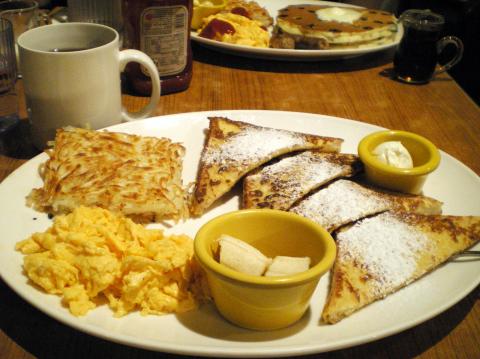A handful of places offering good brunch fare have sprung up in Taipei over the years. However, finding a place that will actually allow you to brunch and not try and move you out within an hour or so is still hard, so this reviewer was happy to find that friends’ recommendations for The Diner lived up to the advanced billing. As did the warnings about the need to call for a reservation because of the long lines that form around the prime brunching hours of 11am to 2pm — at both the Dunhua South Road (敦化南路) branch and the original Ruian Street (瑞安街) branch (reviewed in the Taipei Times on Jan. 19, 2007, p15).
Don’t let the deceptively small first floor put you off waiting; The Diner has a large, pleasant basement room with enough space for about 20 tables in various seating combinations without feeling crowded, including one armchair combo tucked away in the corner.
The person who took my reservation warned us that we would still probably have to wait a bit, but it was worth it. Despite the crunch, the staff was quick to take our orders, the food came promptly, drinks were refilled fairly efficiently and we were able to eat and talk and linger over our coffee and tea for more than two hours.

Photo: Diane Baker, Taipei Times
The Diner has a big menu, ranging from the simple two-egg breakfast (NT$160), steak and eggs (NT$320) or choice of four kinds of scrambled eggs (NT$240), to six types of omelets (NT$180 to NT$250), not including the made-to-order options, which include an egg-whites only version, and five choices under the eggs Benedict label (NT$240 to NT$320).
The “sweet tooth” breakfasts comprise six types of pancakes, from regular to chocolate chip to blueberry (NT$220 to NT$260), plus two eggs cooked to order, hash browns and ham/bacon/sausage or French toast.
All the breakfast plates come with a small glass of orange juice, a ramekin of seasonal fruit, and a bottomless cup of coffee or tea.
With four people, we were able to get a fairly representative sampling of the offerings: the French toast breakfast, a cheese and bacon omelet and two pancake breakfasts, one regular and one with blueberry pancakes.
I was the only one slightly disappointed with my choice — I found the French toast too dry, since I like a more custardy consistency. But it did come with the required dusting of icing sugar — and the scrambled eggs and hash browns were perfect.
I was happily offered a taste of the regular pancakes, and more grudgingly, the blueberry ones, since the friend who had ordered them kept raving about how the blueberries must have been added individually on the grill instead of being mixed into the batter because they were whole berries that popped in his mouth.
For those who want a less filling meal, the pancake options (NT$120 to NT$160) and French toast (NT$120) are available on their own, or you can choose a yogurt fruit cup (NT$110) or peanut butter and jelly sandwich (NT$50).
While leisurely champagne brunches have yet to become popular in Taipei, The Diner does offer beers, wine and a few cocktails in addition to a variety of soft drink, fruit juice and milk shake options.

Under pressure, President William Lai (賴清德) has enacted his first cabinet reshuffle. Whether it will be enough to staunch the bleeding remains to be seen. Cabinet members in the Executive Yuan almost always end up as sacrificial lambs, especially those appointed early in a president’s term. When presidents are under pressure, the cabinet is reshuffled. This is not unique to any party or president; this is the custom. This is the case in many democracies, especially parliamentary ones. In Taiwan, constitutionally the president presides over the heads of the five branches of government, each of which is confusingly translated as “president”

Sept. 1 to Sept. 7 In 1899, Kozaburo Hirai became the first documented Japanese to wed a Taiwanese under colonial rule. The soldier was partly motivated by the government’s policy of assimilating the Taiwanese population through intermarriage. While his friends and family disapproved and even mocked him, the marriage endured. By 1930, when his story appeared in Tales of Virtuous Deeds in Taiwan, Hirai had settled in his wife’s rural Changhua hometown, farming the land and integrating into local society. Similarly, Aiko Fujii, who married into the prominent Wufeng Lin Family (霧峰林家) in 1927, quickly learned Hoklo (commonly known as Taiwanese) and

The Venice Film Festival kicked off with the world premiere of Paolo Sorrentino’s La Grazia Wednesday night on the Lido. The opening ceremony of the festival also saw Francis Ford Coppola presenting filmmaker Werner Herzog with a lifetime achievement prize. The 82nd edition of the glamorous international film festival is playing host to many Hollywood stars, including George Clooney, Julia Roberts and Dwayne Johnson, and famed auteurs, from Guillermo del Toro to Kathryn Bigelow, who all have films debuting over the next 10 days. The conflict in Gaza has also already been an everpresent topic both outside the festival’s walls, where

The low voter turnout for the referendum on Aug. 23 shows that many Taiwanese are apathetic about nuclear energy, but there are long-term energy stakes involved that the public needs to grasp Taiwan faces an energy trilemma: soaring AI-driven demand, pressure to cut carbon and reliance on fragile fuel imports. But the nuclear referendum on Aug. 23 showed how little this registered with voters, many of whom neither see the long game nor grasp the stakes. Volunteer referendum worker Vivian Chen (陳薇安) put it bluntly: “I’ve seen many people asking what they’re voting for when they arrive to vote. They cast their vote without even doing any research.” Imagine Taiwanese voters invited to a poker table. The bet looked simple — yes or no — yet most never showed. More than two-thirds of those